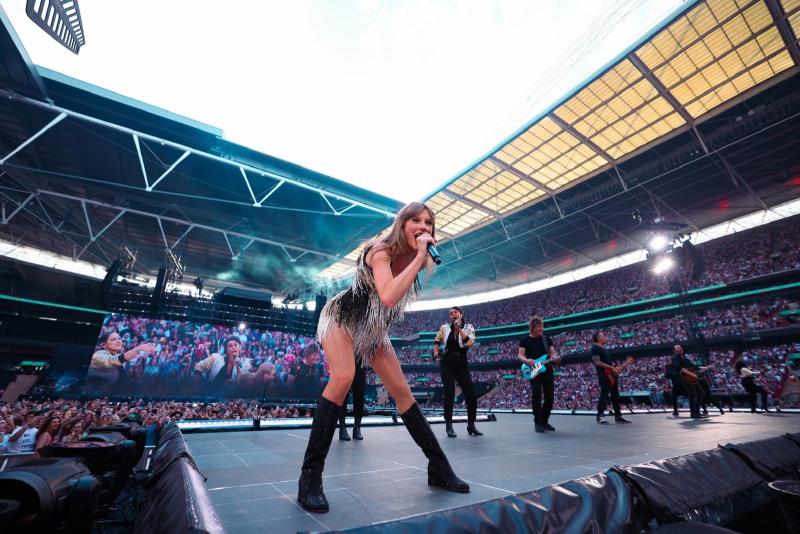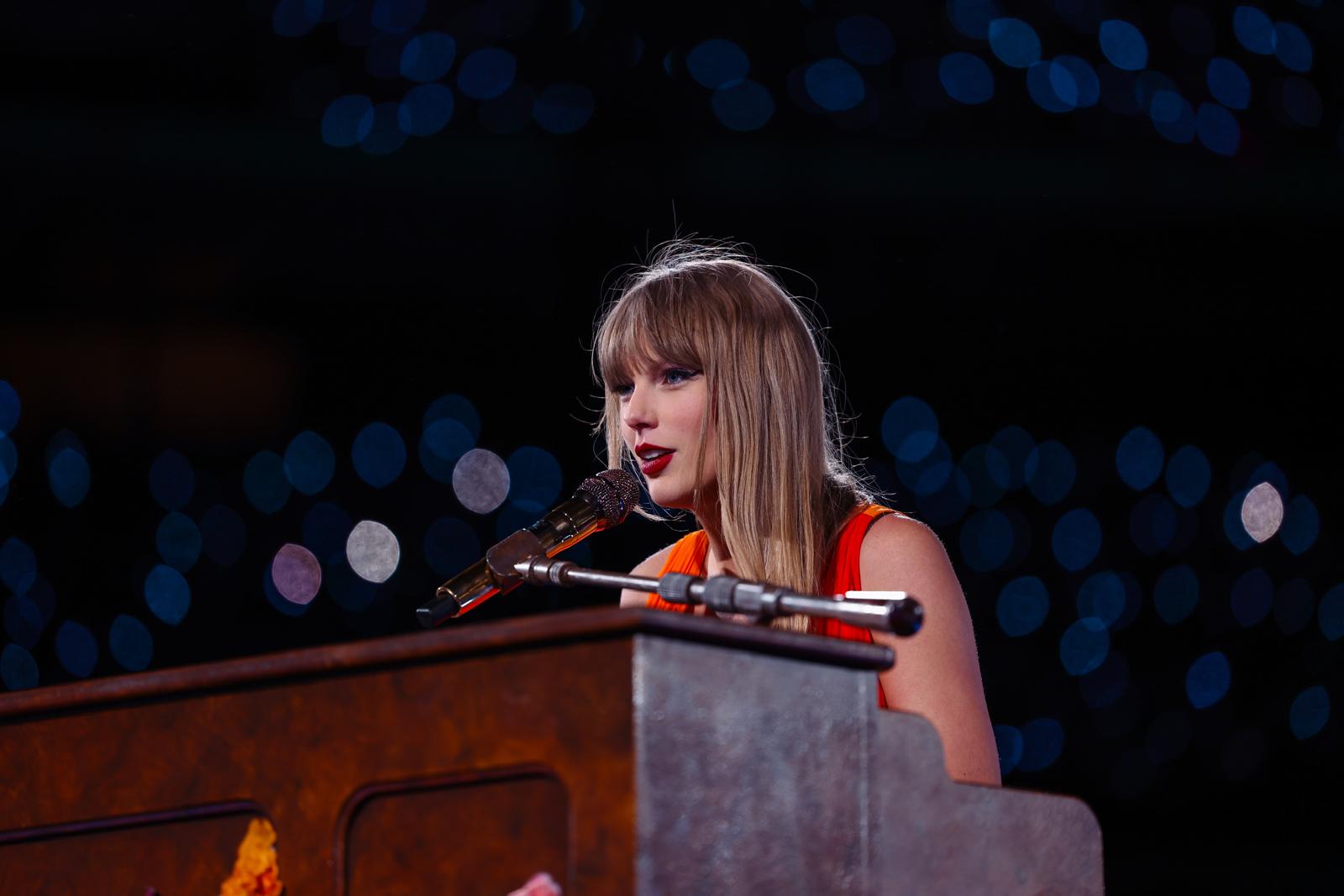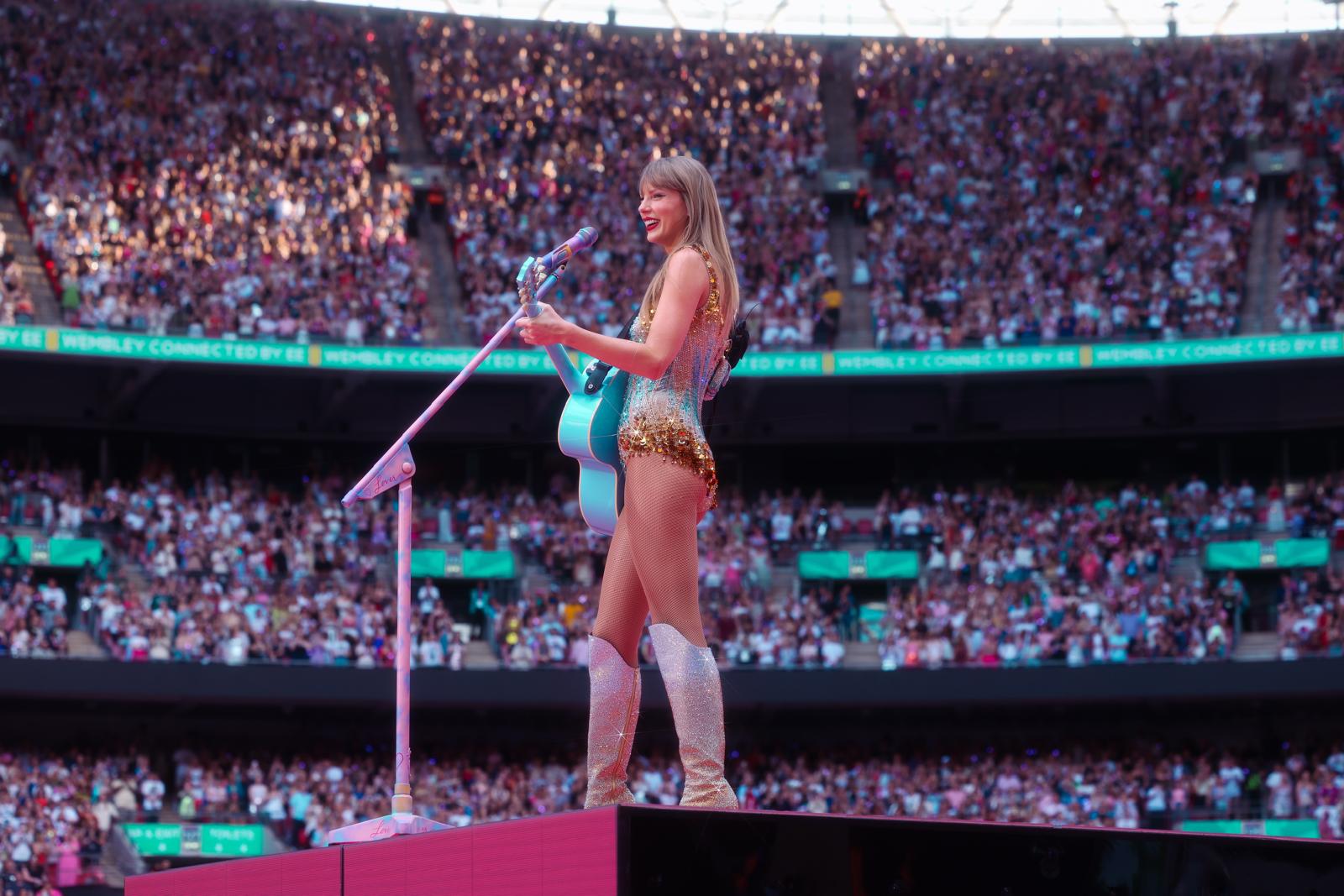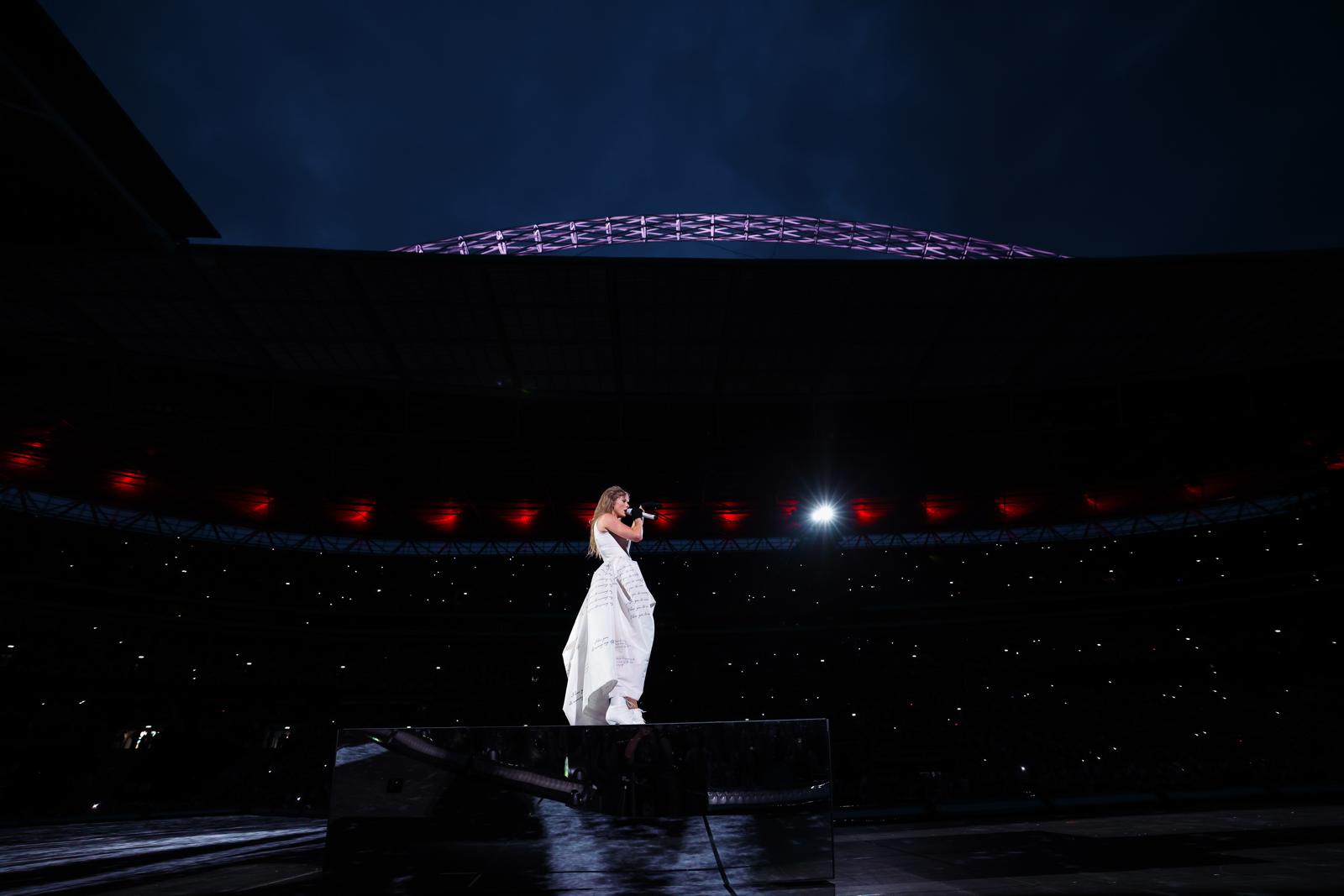Taylor Swift, Wembley Stadium review - the Eras Tour lights up London | reviews, news & interviews
Taylor Swift, Wembley Stadium review - the Eras Tour lights up London
Taylor Swift, Wembley Stadium review - the Eras Tour lights up London
A vivacious and extraordinary celebration of female community and power

Unless you were around when The Beatles toured America in the mid-1960s, it’s doubtful you've heard anything like this. In 40 years of extensive gig-going, I have not. Taylor Swift has just performed “Champagne Problems” at the piano (pictured below), a song from Evermore, the second of her indie-folk flavoured COVID-era albums.
 Swift is wearing a floaty white fairytale dress and is inside a log cabin that’s risen from the stage. Its roof is covered in “moss”. Plastic trees are lined before it. To an ageing culture vulture, it’s the very definition of Umberto Eco’s notion of hyperreal, more Las Vegas than Hans Christian Andersen. To the girls here, it’s simply TikTok-ready cottagecore. And like much else tonight, the roof-raising standing ovation is as much Swifty ritual as spontaneous. The Eras Tour has been going since last March. Its ceremonials are well-established. For all that, it is no less remarkable.
Swift is wearing a floaty white fairytale dress and is inside a log cabin that’s risen from the stage. Its roof is covered in “moss”. Plastic trees are lined before it. To an ageing culture vulture, it’s the very definition of Umberto Eco’s notion of hyperreal, more Las Vegas than Hans Christian Andersen. To the girls here, it’s simply TikTok-ready cottagecore. And like much else tonight, the roof-raising standing ovation is as much Swifty ritual as spontaneous. The Eras Tour has been going since last March. Its ceremonials are well-established. For all that, it is no less remarkable.If you want to read a straight, descriptive gig review, look elsewhere. Yonder internet is chock-a-block with 'em. To do another would be superfluous. The spectacular three-and-a-quarter hour show runs album-by-album, albeit not chronologically, through Swift’s career. Each segment is represented by a look and stage set-up. There are even acres of web pages dedicated to the meanings of each costume, critiques by everyone from ravenous TayTay fanatics to globally recognised fashionistas. Hell, you can watch the whole concert, expertly filmed, on streaming platforms. Eras is the biggest ever stadium tour. Love her or not, it’s a cultural phenomenon as much as a series of giant gigs.
The usual set aside, there’s a small section towards the end that’s different each night, two “surprise” songs. Tonight, the second of her London run, we’re treated to “thanK you aIMee” performed on guitar and with a line dedicated to Wembley. Then, on piano, with Hayley Williams from the night’s second support act, Paramore, “Castles Crumbling”, a song Swift added as a bonus cut on the Taylor’s Version of her third album, Speak Now. To these ears, both are heartfelt balladic numbers, the former with chewy reflective lyrics, the latter with lighters-in-the air heft. But to advanced Swifties they’ll be unpicked as a sally in Swift’s supposed ongoing beef with Kim Kardashian and Ye (as we must now call him). Both songs are presumed to be ripostes.
Rewind to the start of the evening and Paramore deliver a crowd-jollying, persuasive 45-minute set, including a punchy take on Talking Heads’ “Burning Down the House” and concluding with the stadium punk-funk of “This is Why” from last year’s album of the same name. It works as an aperitif, as does the sight of a billion sequins glittering in the evening sun on the west side of this open-to-the-sky stadium. Unfortunately, I missed opening act, Brit singer Griff, because I was drinking pints in local pubs, surrounded by armies of raucously cheerful women glugging rosé Prosecco, their faces pasted in glitter. North London has an occupying army, female, wearing fluff-lined pink cardboard cowboy hats
 After Paramore, there are behind-the-scenes films of Swift making videos with Laura Dern and Dita Von Teese. They set her up as genially approachable. Down below, the crowd shrieks when Tom Cruise suddenly appears from the VIP enclave for a brief round of flesh-pressing, the same with Swift’s boyfriend, the American footballer Travis Kelce. Apparently, Hugh Grant and Greta Gerwig are also down there somewhere but not visible from my very decent stage-left seat.
After Paramore, there are behind-the-scenes films of Swift making videos with Laura Dern and Dita Von Teese. They set her up as genially approachable. Down below, the crowd shrieks when Tom Cruise suddenly appears from the VIP enclave for a brief round of flesh-pressing, the same with Swift’s boyfriend, the American footballer Travis Kelce. Apparently, Hugh Grant and Greta Gerwig are also down there somewhere but not visible from my very decent stage-left seat.
Wembley Stadium only sells one beer, Stella. Happily, it’s the green “unfiltered” version, which is, at least, drinkable. The mass of onsite staff are super-friendly and go out of their way to be helpful, which is not always the case in these gigantic venues. After the P.A. plays Lady Gaga’s “Applause”, a parade of mauve leaf-butterfly people appear on the stage-to-crowd catwalk, turning their petals into flowers that mask the rise of a sequin bodysuited Taylor Swift from the stage to sing a snippet of the electro-yacht gem “Miss Americana & the Heartbreak Prince”. The first wave of monstrous crowd noise explodes.
My favourite Taylor Swift albums are 1989, Lover and Midnights. The latter pair topped’n’tailed the night. The Lover versions are curtailed edits, but singing along to the delicious bounce of “You Need to Calm Down” is still fun. The scream-alongs really rev up with “We Are Never Ever Getting Back Together”, from 2012’s Red. Swift is surrounded by her coterie of dancers in reddish-orange, choreographer Kam Saunders giving it his best London accent, shouting “Do one, tosser” into the mic.
The Reputation section is a blast, Swift in “revenge” mode, her costume a devilish black’n’red one-legged bodysuit, the harder rocking “Look What You Made Me Do” allowing her band, squeezed in stage-left, to shine, while colourful dancers in an array of transparent boxes are shovelled around willy-nilly, as they attempt escape. Or how about full mini-skirted cheerleader Swift leading her gang and us through the inarguable banger “Shake It Off” (from 1989), a song that, on its release, showed she could hold dancefloor space alongside Gaga, Rihanna and the rest. Should also give a mention to the blue neon-hued Tron-style bicycle dancers during “Blank Space”.
 But the main highlight tonight is the vibe. Some context may be apt. I am a 56-year-old cisgender hetero male in a happy long-term relationship. I am very far from Taylor Swift’s target audience. But in my over four decades revelling in popular music, I’ve never seen anything quite like this. Fans are there for all she is. The power she has could only come now. She could, it’s been said with good reason, swing the forthcoming American elections. If she chooses. That is brain-bamboozling.
But the main highlight tonight is the vibe. Some context may be apt. I am a 56-year-old cisgender hetero male in a happy long-term relationship. I am very far from Taylor Swift’s target audience. But in my over four decades revelling in popular music, I’ve never seen anything quite like this. Fans are there for all she is. The power she has could only come now. She could, it’s been said with good reason, swing the forthcoming American elections. If she chooses. That is brain-bamboozling.
I often attend gigs with a primarily male audience, often men in upwards-of-their-forties. Quite a lot of the time these men stand stock still and stare at the gig like they’re at the theatre. Some even tell you to shush if you speak, even if the gig is by a rock band. It’s depressing. It’s boring. It puts me off the whole thing.
Swift’s Wembley crowd is, at a guess, 80% female, not just teens, as I’d imagined, but everyone from tots to mums. There are multitudes here in their twenties and thirties. They stand up at the start of the gig and mostly remain standing and dancing throughout. And they sing along to every song – every song! – with unbridled passion, as if their lives depended on it. If you give yourself up to it, it’s intensely moving. Infinitely preferable to a bunch of fusty BBC 6Music dads gaping zomboid, imagining the latest guitar rock thingy is “happening” (music that, usually, could have been made at any point since the 1970s).
A friend said to me beforehand that by the end of this concert I’d be sick to the back teeth of break-up songs. But I’m not. They’re not my currency but they are the currency of tonight, a glorious communality for all these girls-next-door, their romantic idealism dented but intact. There they all stand, the number 13 marked on their hands, armloads of TS-themed friendship bracelets chinkling, cowboy boots if they can afford them. There they all jig and wave and screech, giving it everything. Girl power! It is magnificent.
Of course, all those dead 20th century social theorists, from Adorno to Baudrillard, would point out that Swift is a ruthlessly efficient part of the consumer-capitalist culture industry. At the highest level. They would be right. She is. Just look at the prices on the queue-bound merch “supermarket”, or the financial stats which surround this tour. But she seems also, broadly speaking, to lean into the positive aspects of humanity.
And, yes, I spoke to Swifties about their gig-going habits and many only go to arena gigs. It seems that an artist has to achieve social media mega/meta-fame before they’re worthwhile. All saved pennies go towards this rather than supporting smaller, rising or local talent. This is a disaster that needs addressing but it’s caused by forces beyond simply Swift’s success.
Songs such as “Daddy I Love Him”, mingled into “So High School”, from the recent The Tortured Poets Department album, are given portent by epic, post-apocalyptic visuals and stately flowing white outfits. While lyrically interesting, the album is overlong and patchy. It could have done with an edit, chopping out the lesser songs. To her fans, there are no lesser songs, every moment a puzzle to study, to unpick. Swift’s life and lore is a saga they’re 1000% invested in, her every turn a reflection of what it is to be a girl in the world, to live and love, be free, be who you are. Taylor Swift makes music but is beyond music.
Closing on 2022’s Midnights is a smart way to finish, a set of songs whose electropop-indie highlights her songwriting chops. They’re not frenetic numbers but somehow become so during this climatic sequence, with the crowd frenzied in vocal adoration. “Anti-Hero” is delivered relatively straight, highlighting the backing singers and band, but also a sing-along at feverish pitch.
She has turned Midnights, a contemplative album at one level, into a party. Taylor Swift is completely in control, yet relaxed too. She has been from the start, when she conducted different areas of the crowd in high intensity shrieking, right through to her closing rendition of “Karma” (“Ask me why so many fade, but I'm still here? 'Cause karma is the thunder rattling your ground”!). We’ve become used to the visual spectacle (did I mention the moment when she suddenly dived into the ground and disappeared!), but the way she behaves, the winks, nods and intimate backwards glances, the way her whole body is her instrument; that never gets old.
Like Bruce Springsteen, whatever you think of her music, Taylor Swift has the rare ability to make vast spaces her own, to combine the eye-bogglingly colossal with a vibrant sense of who she is. And the response of 88,570 devoted Swifties is the icing on the cake. Together they somehow muster a sense we’re all in this together. Even an old fart who last had dating issues long, long ago.
Below: Watch a trailer for Taylor Swift's Eras concert film
rating
Share this article
The future of Arts Journalism
You can stop theartsdesk.com closing!
We urgently need financing to survive. Our fundraising drive has thus far raised £49,000 but we need to reach £100,000 or we will be forced to close. Please contribute here: https://gofund.me/c3f6033d
And if you can forward this information to anyone who might assist, we’d be grateful.

Subscribe to theartsdesk.com
Thank you for continuing to read our work on theartsdesk.com. For unlimited access to every article in its entirety, including our archive of more than 15,000 pieces, we're asking for £5 per month or £40 per year. We feel it's a very good deal, and hope you do too.
To take a subscription now simply click here.
And if you're looking for that extra gift for a friend or family member, why not treat them to a theartsdesk.com gift subscription?
more New music
 Benson Boone, O2 London review - sequins, spectacle and cheeky charm
Two hours of backwards-somersaults and British accents in a confetti-drenched spectacle
Benson Boone, O2 London review - sequins, spectacle and cheeky charm
Two hours of backwards-somersaults and British accents in a confetti-drenched spectacle
 Midlake's 'A Bridge to Far' is a tour-de-force folk-leaning psychedelic album
The Denton, Texas sextet fashions a career milestone
Midlake's 'A Bridge to Far' is a tour-de-force folk-leaning psychedelic album
The Denton, Texas sextet fashions a career milestone
 'Vicious Delicious' is a tasty, burlesque-rockin' debut from pop hellion Luvcat
Contagious yarns of lust and nightlife adventure from new pop minx
'Vicious Delicious' is a tasty, burlesque-rockin' debut from pop hellion Luvcat
Contagious yarns of lust and nightlife adventure from new pop minx
 Music Reissues Weekly: Hawkwind - Hall of the Mountain Grill
Exhaustive box set dedicated to the album which moved forward from the ‘Space Ritual’ era
Music Reissues Weekly: Hawkwind - Hall of the Mountain Grill
Exhaustive box set dedicated to the album which moved forward from the ‘Space Ritual’ era
 'Everybody Scream': Florence + The Machine's brooding sixth album
Hauntingly beautiful, this is a sombre slow burn, shifting steadily through gradients
'Everybody Scream': Florence + The Machine's brooding sixth album
Hauntingly beautiful, this is a sombre slow burn, shifting steadily through gradients
 Cat Burns finds 'How to Be Human' but maybe not her own sound
A charming and distinctive voice stifled by generic production
Cat Burns finds 'How to Be Human' but maybe not her own sound
A charming and distinctive voice stifled by generic production
 Todd Rundgren, London Palladium review - bold, soul-inclined makeover charms and enthrals
The wizard confirms why he is a true star
Todd Rundgren, London Palladium review - bold, soul-inclined makeover charms and enthrals
The wizard confirms why he is a true star
 It’s back to the beginning for the latest Dylan Bootleg
Eight CDs encompass Dylan’s earliest recordings up to his first major-league concert
It’s back to the beginning for the latest Dylan Bootleg
Eight CDs encompass Dylan’s earliest recordings up to his first major-league concert
 Ireland's Hilary Woods casts a hypnotic spell with 'Night CRIÚ'
The former bassist of the grunge-leaning trio JJ72 embraces the spectral
Ireland's Hilary Woods casts a hypnotic spell with 'Night CRIÚ'
The former bassist of the grunge-leaning trio JJ72 embraces the spectral
 Lily Allen's 'West End Girl' offers a bloody, broken view into the wreckage of her marriage
Singer's return after seven years away from music is autofiction in the brutally raw
Lily Allen's 'West End Girl' offers a bloody, broken view into the wreckage of her marriage
Singer's return after seven years away from music is autofiction in the brutally raw
 Music Reissues Weekly: Joe Meek - A Curious Mind
How the maverick Sixties producer’s preoccupations influenced his creations
Music Reissues Weekly: Joe Meek - A Curious Mind
How the maverick Sixties producer’s preoccupations influenced his creations

Add comment